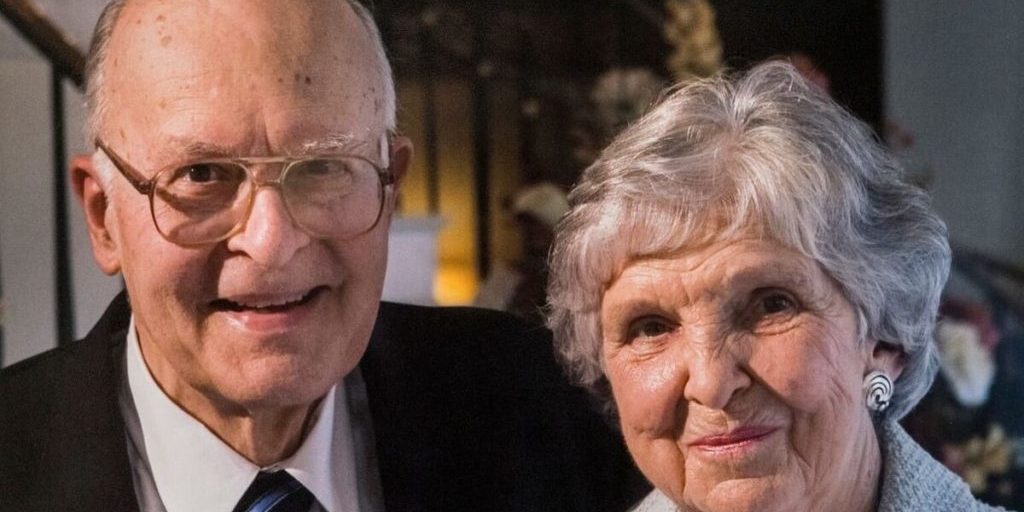
In Memoriam: Dr. James Leo Garrett, Jr.
Dr. James Leo Garrett Jr. was born November 25, 1925 in Waco, TX. His father was a business teacher at Baylor University. He made his profession of faith at the age of nine and was baptized into the fellowship of Seventh and James Baptist Church. Garrett was later licensed and ordained to the ministry at First Baptist Church of Waco. He earned a BA in English from Baylor in 1945, then a Bachelor of Divinity from Southwestern Baptist Seminary in 1948. In 1949 Garrett was granted the degree Master of Theology at Princeton Theological Seminary before returning to Southwestern to obtain a Th.D. in 1954, and later, a Th.D. from Harvard University in 1966. His teaching ministry took him to Southwestern (two different stages, 1949-1959 and 1979-1997), to Southern Baptist Theological Seminary (1959-1973), and Baylor University (1973-1979) where he was the director of the J. M. Dawson Studies in Church and State and professor of religion. He also taught during his Sabbaticals at a half-dozen schools around in the world, such as Hong Kong, Ukraine, Russia, Romania, Mexico, and Brazil.
A Theologian’s Theologian
Dr. Garrett was a teacher’s teacher. His knowledge of theology was encyclopedic and he was a stimulating lecturer, two qualities that do not always converge in a single person. I first encountered him when I took the required 4-hour Systematic course from him in my final semester as an M.Div. student in Spring, 1980. I was dumbfounded at his ability to incorporate his vast learning in a dialogic lecture style that was stimulating and insightful. One had a difficult time just keeping up and taking careful enough notes to give one confidence that he could pass the (difficult) mid-term and final exams. He became known as “Machine-gun Garrett” for his rapid-fire lecture style. Yet, these lectures always included material that was not merely academic theology but also led us as students to have a sense of the greatness of our Lord and the beauty of the salvation that Christ came to offer.
His writings also set him aside as a theologian’s theologian. He published several shorter books early in his ministry, as well as numerous essays and reviews. His great works came later in his ministry. His Systematic Theology: Biblical, Historical, & Evangelical, 2 vols. (Eerdmans, 1990, 1995) is a comprehensive work on the subject. His former students will recognize that in this work he has incorporated the substance of his lectures, but in a truly literary format in this approximately 1,500-page study. In this publication we have before us only the third comprehensive systematic theology text written by a Southern Baptist in the twentieth century, the first two coming from the pens of E. Y. Mullins (1917) and Dale Moody (1981), both Southern Seminary professors. Some have criticized the work as more of a “catalogue” of theological interpretations of biblical texts and theological opinions down through the ages. At some level this is true as the author was especially concerned to lay-out the various options for theological students to consider. It is also the case, however, that on key matters of interpretation, Garrett’s position becomes clear in his exposition.
In 2009 he published Baptist Theology: A Four-Century Study (Mercer University Press). This is a monumental achievement. As he winds his way through the various controversies that have marked Baptists since their origins in the early seventeenth century, it becomes clear that Garrett has wrestled with them in their original context. The second conclusion that the reader of this volume will glean is the author’s deep love and appreciation for the Baptist heritage and for Baptist churches.
I studied with Leo Garrett at two separate times in my educational pilgrimage. As I indicated, the first was in Spring theology class in 1980, but the second was more intensive and the more formative, as he was my doctoral supervisor (my Doktovater) from Fall, 1992 till my Ph.D. work was completed in 1998. My dissertation was, in fact, the last one he supervised in his years as a professor. (I joked with him that my dissertation “done him in.”) Several experiences in that period come to mind as I think about this professor’s impact on my life and my practice as a teacher of theology.
One occurred in Dr. Garrett’s Theology of Augustine seminar. Theology seminars at Southwestern in those days lasted an entire school year, Fall and Spring. Garrett had us read most of the corpus of Augustine’s writings in the Fall and then we each presented papers to be analyzed by the professor and the other students in the Spring. I recall on one occasion in that seminar that an issue in Augustine’s theology arose. Specifically, the debate that day was between one other student (his first name was Stacy) and me. I proffered an interpretation of the issue as it related to fifth century Western theology. Stacy disagreed and immediately indicated his alternative explanation. We sat next to each other in a seminar of fifteen students, and so, as our debate heated up, all eyes were fixed on our little section of the u-shaped tables. We must have gone back-and-forth for about ten minutes when I suddenly became aware that everyone was watching our increasingly voluble exchange. At that point I looked over at Garrett and he had a big smile on his face. Noticing that we had both stopped talking (finally), he commented, “That is what a Ph.D. seminar is all about, isn’t it?” From that moment on I considered theological debates to be in the will of God. After, hadn’t my beloved professor said so?
Another occasion was a bit more humbling. After completing my doctoral seminars, I answered the call from North Greenville College (now, University) to come as Assistant Professor of Christian Studies. That meant, in effect, that I would have to write the last four chapters of the five chapters of my dissertation while I was off-campus. I wrote chapter two during my first Christmas break, and then mailed it off to my professor. A couple of weeks later I received my chapter back from Garrett. He had marked it up in red, catching many errors of form and style and a few of interpretation. At the end of the chapter he had one painful (for me) comment. “Please in the future do not send these to me until they are ready.” Boom! I can tell you that I was meticulous and almost even apprehensive as I prepared and submitted chapters three through five to him. And, all was much better after chapter two. I had forgotten that his undergraduate degree was in English. My future doctoral students would experience Garrett’s meticulous editing second-hand, from his last doctoral student, often much to their chagrin.
More than a teacher
James Leo Garrett was more than a teacher—he was a mentor, at least to many of us. On more than one occasion I witnessed him standing in the hallway, praying with a student after class about some concern the student had expressed to him. I had left Ft. Worth for Greenville in 1996, but a year later returned to Cowtown due to the death of my father-in-law. I had prayed for his salvation for many years. While there, I paid a visit to “The Hill,” and happened by chance, or so I thought, to run into Dr. Garrett and another of my theology professors, Jan Kiwiet. I told them why I was in Ft. Worth and expressed my concerns for my father-in-law to both of them. I remember Dr. Garrett noting to me, “You know, Chad, many times we never know how someone has dealt with their sin and with Christ in the last weeks or even the last days of their lives. Be hopeful!” Encouraging words, indeed!
As I sit at my desk and look up I see Leo Garrett’s two works of magna opera, his Systematic Theology and his history of Baptist theology right there, at arm’s length, alongside other volumes that I have turned to over and over again. As he was my teacher and mentor in all things theological, so it continues to be even now since the Lord has called him home. Dr. Garrett and I did not agree on every issue. I am more Calvinistic than he was, I disagree with him on some issues of ecclesiology (specifically on the viability of elder-led churches), and on eschatology. But even those disagreements have been hammered out, at least in part, in dialogue with my Doctoral Father. I can only hope and pray that Garrett will continue to hold forth among Baptist and other theological students and pastors, so that though he is gone now in the flesh, that his work will carry on. I am glad to have done “Theo with Leo,” and it is my prayer that, “He, being gone, yet speaketh.” But for this time, I am glad that he has entered the Saints’ everlasting rest.

